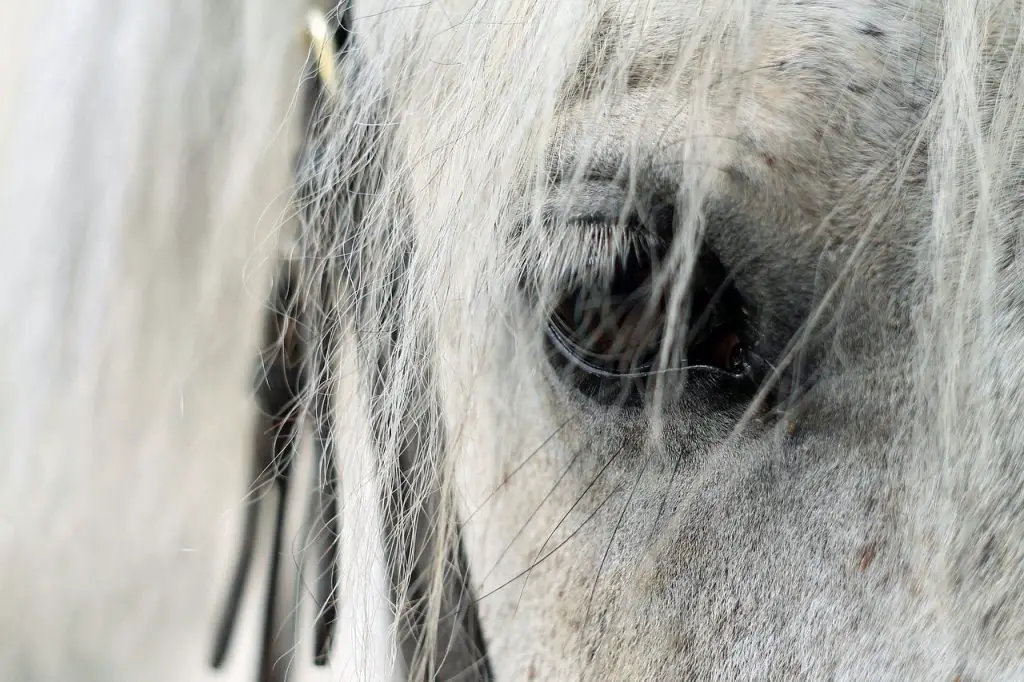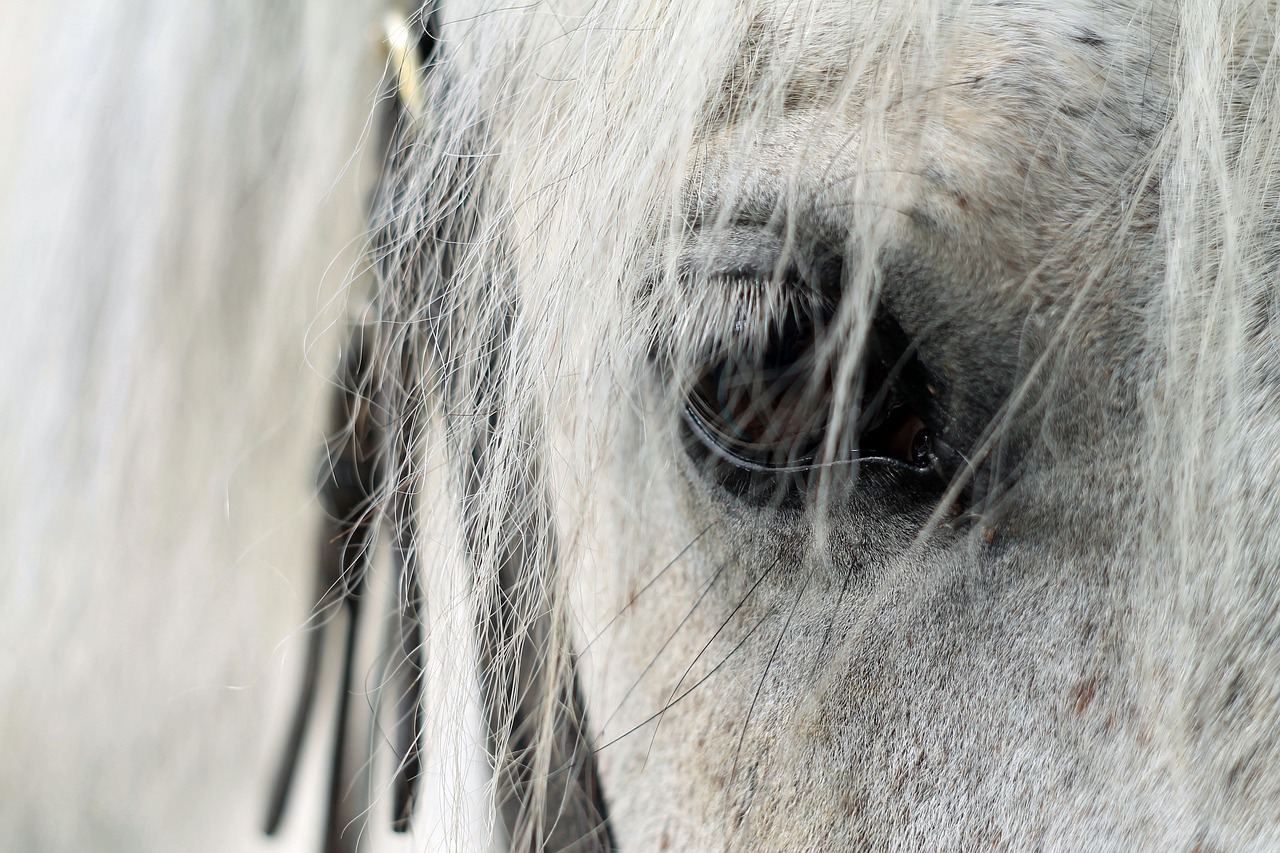Last Updated on February 28, 2022 by Allison Price
Research shows that horses can become depressed. Here are some facts about depression in horses.
Although we know that humans can experience major mood disorders like depression, do horses suffer from it? There is evidence that horses can suffer from depression. Dependent on their living arrangements, social interactions and their training methods, domestic horses can be in chronic stress.
A depressed horse might have a disinterested gaze, an immobile head and ears and a neck that is roughly parallel to the back.
Study Shows Evidence
France’s study compared the behavior of domestic horses during depression to those in depressive states in humans. Researchers observed the behavior of 59 horses over six months in their natural environment. They mainly focused on periods of immobility when the horses display unusual postures.
The horses were also assessed for their ability to adapt to their environment, their anxiety levels, and the amount of stress hormone cortisol they had in their blood.
The horses came from three different riding schools and were a mix of breeds. They all had the same type and feed and worked the same hours. Two elements were examined in the study: spontaneous expressions of “behavioral despair” as well as unresponsiveness to various environmental stimuli (tactile/visual and non-human).
Researchers collected all behaviors and paid special attention to immobile moments when they identified a specific posture (called “withdrawn”). This was distinct from other typical stances.
Horses that displayed the “withdrawn” pose were immobile with their eyes open, stretched necks (open neck angle), and necks at the same level as their backs. This posture is different from the one of a horse who is more attentive to his surroundings and whose neck is higher. Also, their ears are open.

It is also different from a resting horse’s posture, which relaxes his muscles and rotates his ears laterally. This allows his eyelids to droop and his neck to slope lower and rounder.
The depressed horse may have an open-eyed, dull-eyed, unfocused gaze, and immobile head and ears that suggest “behavioral despair.” However, they were more responsive to stimuli in their environment and more emotional responses to difficult situations than the non-withdrawn horses.
These characteristics are very similar to depressive symptoms in humans and animals.
Twenty-four percent (59 horses) presented the immobile head and ears at least four times in 30 minutes. This depressive syndrome was more common in mares than in other horses, accounting for one-third of the mares that were included in the study.
Depression: Causes
For domestic horses, there are many things that can cause chronic stress. Long-term exposures to repeated or inescapable stressors can lead directly to depression. These or other factors could be the cause of stress in horses and depression later on.
* Pain. * Pain. This is a very common stressor that can drastically affect horses’ emotional state. This can also lead to stall rest being imposed. This can prevent horses from socializing, exercising, or grazing, which can lead to more stress.
* Social isolation. Social isolation is one of the main causes of stress in social animals like horses, according to Stanford University neuroscientist Robert Sapolsky. Horses that are kept alone, isolated or in stables for long periods of time will be more likely to suffer from stress-related diseases and depression.
* Confinement. Horses can travel over 100 miles per day so it is not natural for them to be restricted in a small space, unable move around and graze. It’s not surprising that horses may begin to perform stereotypical behaviors such as windsucking and weaving when they are kept in a stable for long periods of time to deal with being restricted from movement.
Harsh training. Exercising for too long (either in competition or training) can lead to physical stress. Horses can also be put under severe mental and physical strain by being punished or placed under physical restraints. Horses can be afraid of their trainers and their environment if they are subject to coercive or harsh training methods. This leads to stress.
* Transport. Numerous studies have shown that transport can increase colic risk. Trailered horses can be restricted and unable move and may also be exposed to excess heat/cold and poor ventilation. They could also be exposed to slippery floors and poor drivers.
* Boredom. Horses are intelligent and require mental stimulation. Horses that are bored quickly become stressed and frustrated. People who are kept in a boring or solitary paddock for prolonged periods of time or those that get little exercise or have no other activities can become depressed and stressed, which could lead to a variety of behavioral problems.
Stressed and frustrated horses can easily become bored.
Photo by Pixabay.com
* Unpredictability. Horses, as prey animals need to feel safe. If their environment changes constantly, they might not feel secure enough to relax. Horses can become anxious and restless from unfamiliar surroundings, new horses, unpredictable noises, changing feeding schedules, inconsistent trainers and inconsistent training methods.
* Horses with stressed handlers. Horses can be adversely affected by the emotional state of their handlers and other horses. One example is if one horse in a herd becomes aggressive or tense, it can cause problems within the herd, and tension among the other members.
* Feeding. Horses can “trickle feed” which is grazing while they roam for as much as 18 hours per day. This means horses eat three large meals per day with a small hay net at night. It is not a good feeding schedule as it can cause stress and leave them hungry and vulnerable to developing gastric ulcers.
Signs to Watch Out For
If you look at the following signs, you can identify depression in horses: a level-necked “withdrawn” posture, dull stare, immobile head, ears, reduced reactions to people, but increased responsiveness to new stimuli.
Uninterested horses may stand still and look at the wall from their stall.
You should also be on the lookout for these signs:
*Stereotypies such as cribbing and weaving.
* Unpredictable behaviors.
*Long periods in immobility.
* Reduced appetite/changes of weight.
* Unwillingness to Work.
*Lacking sleep.
* Increased susceptibility for infection.
* Poor muscle development.
* Increased fear, anxiety or spookiness.
*Avoiding any other horses.
You should schedule a thorough vet checkup if you notice any changes in your horse’s behavior or attitude. If horses are suffering from depression, they can develop gastric ulcers and colic.
There are options to alleviate depression in horses
Simple changes in your horse’s management can make a big difference to his mood and improve his outlook. Changes in his lifestyle can be made with the goal of making him more comfortable and allowing him to live a more natural, but still maintaining some routines.
Provide a stable or pasture companion for your horse if he is living alone. You might consider allowing a friend to take your horse in if you don’t have the funds to buy another horse. You can also keep your horse company with a goat, donkey, or other animal from the barn if you are unable to take on another horse.
You can avoid loneliness by providing your horse with a companion animal, such as a donkey, horse, goat or another animal from the pasture.
Photo by stock.adobe.com
You can take the necessary steps to ensure your horse is safe if he shows signs of stress due to an aggressive companion.
Depression can be reduced by increasing turnout, or giving your horse more time to turn out. You will need to think about what it will take to make the change. This could mean that you have to modify your schedule, hire an employee, swap favors, or move to a stable that offers turnout. It is so important in a horse’s life that it should be a priority.
Access to forage is a great way to improve a horse’s mental state. You can adjust your feeding schedule (perhaps with slow-feed nets), so that he can graze throughout the day. You can improve his mood by enriching his environment and extending his “chew time”.
Final, evaluate your riding and training program. Do you expose your horse too harsh methods, long training sessions, unrealistic expectations or environmental problems like extreme heat or poor footing? All of these factors, or a combination thereof, can discourage your horse and make him less willing to perform or be handled.


